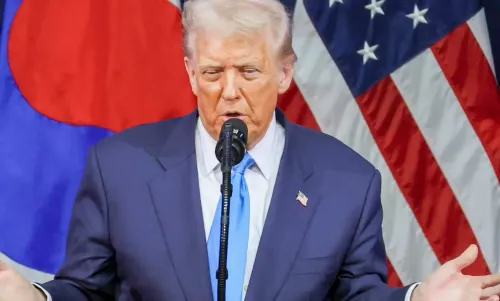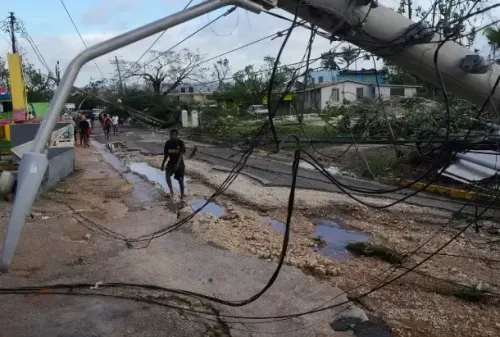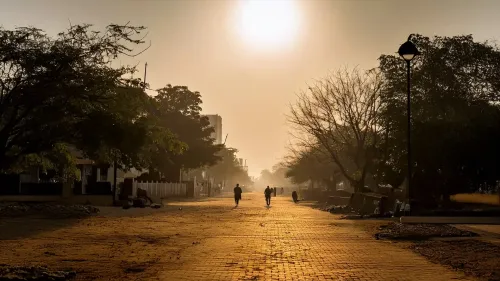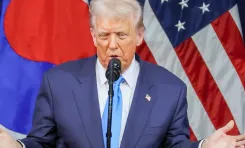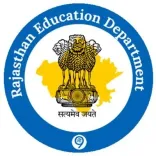CAG Report Unveils Kejriwal's Alleged Rs 2,026 Crore Liquor Scam
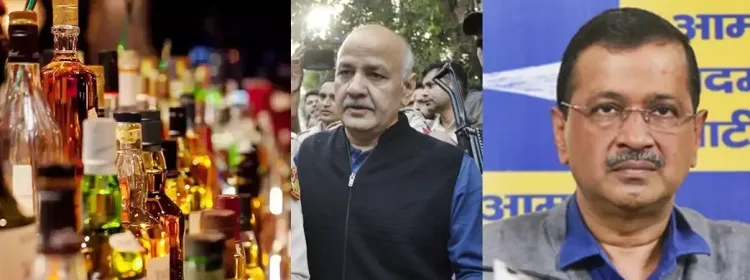
New Delhi, Jan 11 (NationPress) Former Delhi Chief Minister Arvind Kejriwal and his cabinet members are accused of embezzling more than Rs 2,026 crore through a liquor excise policy that was characterized by a lack of transparency and dubious decision-making that appeared to benefit select licensees, according to a report by the Comptroller and Auditor General of India (CAG) that was made public on Saturday.
The report, titled "Report of the Comptroller and Auditor General of India on Performance Audit on Regulation and Supply of Liquor in Delhi," has brought to light the alleged liquor scam.
The severe findings from the CAG, Girish Chandra Murmu, regarding the AAP government's contentious liquor policy pose a significant challenge for the ruling AAP party ahead of the upcoming Assembly elections on February 5, providing new leverage to the opposition parties, BJP and Congress, who have labeled the scandal as “Liquorgate.”
Murmu recommended that “responsibility and accountability should be established for the observed lapses and that the enforcement mechanisms need to be strengthened,” in his concluding remarks for the report covering the fiscal year ending March 31, 2022. This report was co-signed by Aman Deep Chatha, Principal Accountant General (Audit), Delhi.
The Leader of Opposition in the Delhi Assembly, Vijender Gupta, remarked, “The Aam Aadmi Party government of Delhi has today shown itself to be the most corrupt government in the country.”
“We demand clarity on who profited from the misuse of public funds and which AAP leaders received illicit payments,” he stated.
A critical observation in the report was the absence of established laboratories for testing the quality of liquor supplied in Delhi, which posed health risks to millions of residents.
The auditor's investigation criticized the AAP government’s policy formation and execution, highlighting numerous irregularities, such as lack of transparency in pricing, breaches in the issuance and renewal of licenses, failure to penalize violators, and neglecting to seek approval from the LG, Cabinet, or Assembly.
“The actual implementation was suboptimal, and the intended goals of the policy were not met. Retail outlets in non-compliant wards could not be established, and a fair distribution of retail outlets was not achieved. There were significant flaws in the issuance and management of zonal licenses,” the report stated.
The ruling AAP has challenged the authenticity of the ‘leaked’ CAG report and refuted claims of misconduct against Kejriwal and his ministers, including Manish Sisodia and Satyendra Jain, who were arrested and subsequently released on bail concerning money laundering and corruption cases tied to the excise policy.
The CAG document revealed that the government incurred a loss of approximately Rs 890 crore because the AAP administration failed to re-tender surrendered retail liquor licenses.
The report highlighted, “There was insufficient scrutiny of the business entities concerning their financial stability and management capabilities. Instances of related business entities holding licenses throughout the liquor supply chain were noted.”
“Data on liquor supply indicates exclusive agreements between zonal licensees and wholesalers as well as brand favoritism. The surrender of zonal licenses during the extended policy period further contributed to significant revenue losses. Other vital measures planned in the policy, such as establishing laboratories for quality assurance and setting up super premium outlets, were not executed,” it stated.
The government lost an additional Rs 941 crore due to the exemptions granted to zonal licensees, according to the report.
The Group of Ministers led by Manish Sisodia allegedly neglected the recommendations of the expert panel and allowed disqualified entities to participate in the license bidding process.
The allegations of misconduct, which have led to Kejriwal, Sisodia, and several other officials facing money laundering and corruption investigations, are expected to escalate the political climate in Delhi, where the AAP is seeking to retain power for a fourth consecutive term.
The elections for the 70 Assembly seats are scheduled for February 5, with results to be announced on February 8. Currently, the AAP holds 62 seats in the Assembly, while the BJP has 8.

